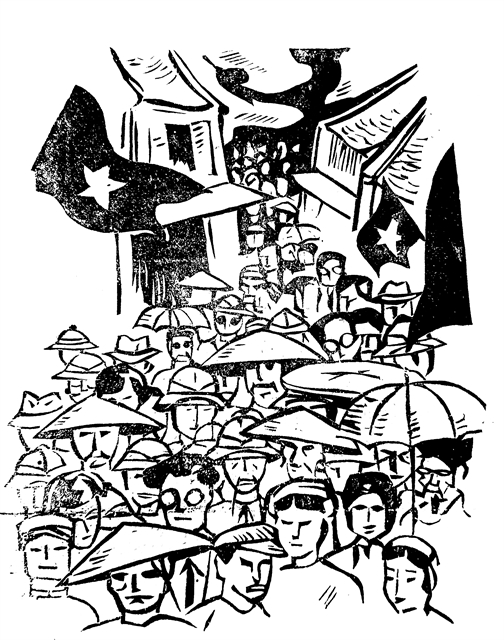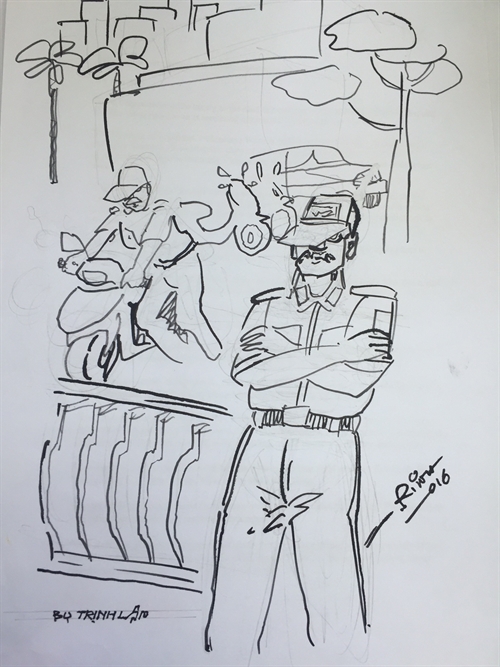 Talk Around Town
Talk Around Town

In Việt Nam, security guards are normally less respected than other professions such as nine-to-five officers. The average income of a guard is modest at about VNĐ3-4 million a month. That might be the reason why it is difficult to attract young workers to this job.
 |
By Mộc Miên
Colleagues in my office are concerned about Nguyễn Thị Hoa’s absence, due to taking her father to hospital to treat his newly broken leg.
“He was doing his job as a security guard for a private company. Yesterday he had to manage a lot of motorbikes of guests and employees, and he wasn’t careful enough. My poor father!” Hoa, my colleague, said sadly over the phone.
All of us feel so sorry for him because at the age of over 60, no one knows when his leg will fully recover.
It is not the first time I heard about a senior citizen who took a job as a security guard and suffered occupational risks.
In Việt Nam, security guards are normally less respected than other professions such as nine-to-five officers. The average income of a guard is modest at about VNĐ3-4 million a month. That might be the reason why it is difficult to attract young workers to this job.
Years ago, security guards in office buildings, organisations and companies were often senior citizens, some even older than 60. The labourers used to be retired soldiers, public employees or unskilled workers who were trying to find a simple job to earn extra money.
Nowadays, security services have become more professional with the birth of many private companies that are active in bringing security services to those in need. They have been acting as a bridge between organisations and security workers. Companies often hire employees with wide age ranges, including the young and the old. The number of young adults has increased rapidly in the sector. But it doesn’t mean that the number of senior citizen employees has fallen drastically.
In fact, from my experience, security guards should be quick, flexible and have good observation skills. With the rapid development of the service sector, security workers now have to guard cars and motorbikes, and take and return vehicles to guests. Such responsibilities expose security guards to more risks, including injury and robbery.
“Sometimes I cannot understand why old people do these jobs,” said Nguyễn Anh Tuấn, an officer. “They cannot be as quick as the young ones. How would they react if there is an emergency? They are more likely to get hurt or wounded while guarding a lot of vehicles and other assets.
“Watching an old security guard pull and push a motorbike out of a crowded parking lot, I feel unsafe and worried.”
In reality, most security guards haven’t received any official training on the job. It seems that any man with moderate health can perform this job.
“I am retired now, but the pension cannot cover my living costs,” said Nguyễn Văn Tuấn, 62, a security guard for a café on Nguyễn Khắc Cần Street.
“Spending all day at home makes me weak and bored, so I decided to take this job to fix the problem.
“On hot days in summer and cold ones in winter, I have to stay outdoors, which challenges my health a lot. But I still have to do this to meet my daily needs.”
In this regard, private securities companies have their own opinions on the practice of hiring elderly people.
“The mass birth of office buildings, enterprises and organisations has increased the demand for security guards. We need a lot of people to meet that demand,” said Hoa M.T., personnel manager for Việt Phú Security Service Company.
“Retired employees from State-owned organisations have a high sense of responsibility and discipline,” she added. “They fit this job very well.”
This argument supports senior citizens’ access to employment opportunities regardless of the risks they may suffer.
“My father knows that the job is not as easy as he previously thought, but he is determined to take it rather than sitting at home all day with a small pension,” my colleague, Nguyễn Hoa, said. “He needs more money and the feeling of being useful.” — VNS